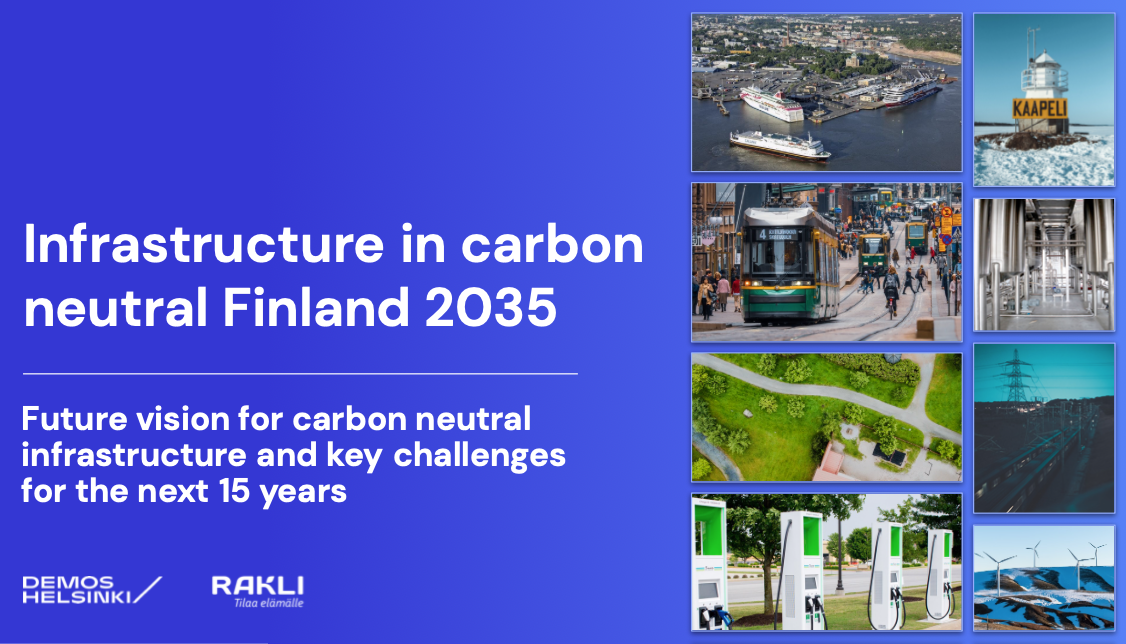
Since October 2020 Demos Helsinki and RAKLI have been imagining the future of carbon neutral infrastructure in cooperation with 12 key actors in the field. Participating stakeholders include cities, energy companies, infrastructure developers, contractors, manufacturers, a construction company and a financial institution. The aim of the multistakeholder project is to scan the changing operative environment, identify the main challenges related to carbon neutral infrastructure and how to solve these challenges with concrete actions. The “Infrastructure in carbon neutral Finland 2035” project is divided into two phases, and the second phase has just started in April. Would you like to get involved? Contact us here!
Infrastructure is everywhere. It is a part of our everyday lives and almost every activity we partake in. However, it is so tightly woven into our daily actions that we do not even think about its role – at least until it isn’t there or it doesn’t work. One could go as far as to say that the sign of good infrastructure is that you don’t need to give it a second thought. Indoor plumbing, running water, heating, telecommunications, roads, parks, harbours… The spectrum is so wide that it is hard to fit everything under one classification. However, it can be said that infrastructure can be found where things, goods and people move as the bloodline of our societies.
Therefore, it is no exaggeration to state that infrastructure will either prevent or enable Finland reaching its target of being carbon neutral by 2035. Public and private actors have piloted carbon neutral and low-carbon infrastructure solutions, reduced emissions and evolved new material solutions. However, a common vision for the industry is lacking. And if we continue on the path of slow changes and development as we have so far, the carbon neutrality target will not be met on schedule.
To prevent that from happening, the infrastructure sector should be seen as a whole. Transformation is needed from both public and private infrastructure actors in the next decade. What has been lacking is a common vision of what a carbon neutral society and its infrastructure functions should look like. Also an understanding of challenges, their scope and impact as well as solutions to those challenges is required.
To speed up the transformation of infrastructure, Demos Helsinki in cooperation with RAKLI launched the ‘Infrastructure in Carbon Neutral Finland 2035’ project. It brings together key infrastructure players to answer the following goals:
- Understanding the future the operating environment and vision for the next 15 years
- Identifying key challenges and solutions to these
- Creating synergies between the actors involved in the project
- Describing the scale and effectiveness of different solutions in terms of the overall transformation
- Creating uniform principles for infrastructure carbon footprint calculation
The first phase of the project consisted of three round tables, where stakeholders jointly outlined six of the biggest challenges for infrastructure in a carbon neutral society as well as pilots, projects and innovations to address these challenges. In the second phase that started in the beginning of April, we will focus on identifying more key solutions, bottlenecks and stakeholder connections, defining principles for the calculation of low carbon infrastructure, and assessing the scale of effectiveness of different actions. As a result of the project, the stakeholders involved will have an understanding how they can transform their operations and with whom to achieve carbon neutrality in infrastructure.
The first projects arising from this and aiming to promote carbon neutrality are already on the planning table. The next time you cook, browse the web, charge your phone, or go to the grocery store, think about what your life would look like without functioning infrastructure?
If you are interested in learning more or joining the project, please contact Henrik Suikkanen, +358 44322 2632, or henrik.suikkanen@demoshelsinki.fi!